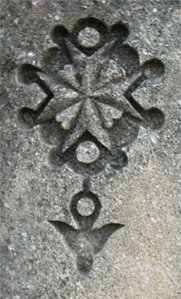Protestants en poitou, Généalogie des familles huguenotes du 16e et 17e siècles
Every day life
The concepts of the Reform influenced the Huguenots’way of life as mentioned hereafter.
Childhood
Unlike Catholics Huguenots don’t think procreation is the aim of marriage thus a lower birthrate.
The fact that they don’t have to christen the child within the two days following its birth allows them to choose a fine day to take it to the assembly to be christened, which can explain the lower postnatal deathrate.
As religion depends on reading the Bible, the children, both male and female learn how to read and write.Marriage
Being used to marry within the same social level, the men tend to choose their partners from another parish thus favoring a mixing of populations and avoiding marriages between blood relations.
An important deathrate in first pregnancies bring about the re-marriages of numerous husbands and the re-arrangement of families.
After writing their marriage contract before a notary with their families – most often on community property with the parents of one of the fiancés –, their marriage is solemnized along with other couples at the end of the assembly. They have come alone while the family is preparing the wedding banquet.Old age
When they weren’t lucky enough to live with their children, old parents had recourse to other people, nephews or strangers giving in return all their possessions by will.
In their will they ask to be buried according to their faith in the cemetery of their choice. No ceremony, no minister were required for the burial in open ground.
According to the tradition in the Poitou region, all children inherit equally.
